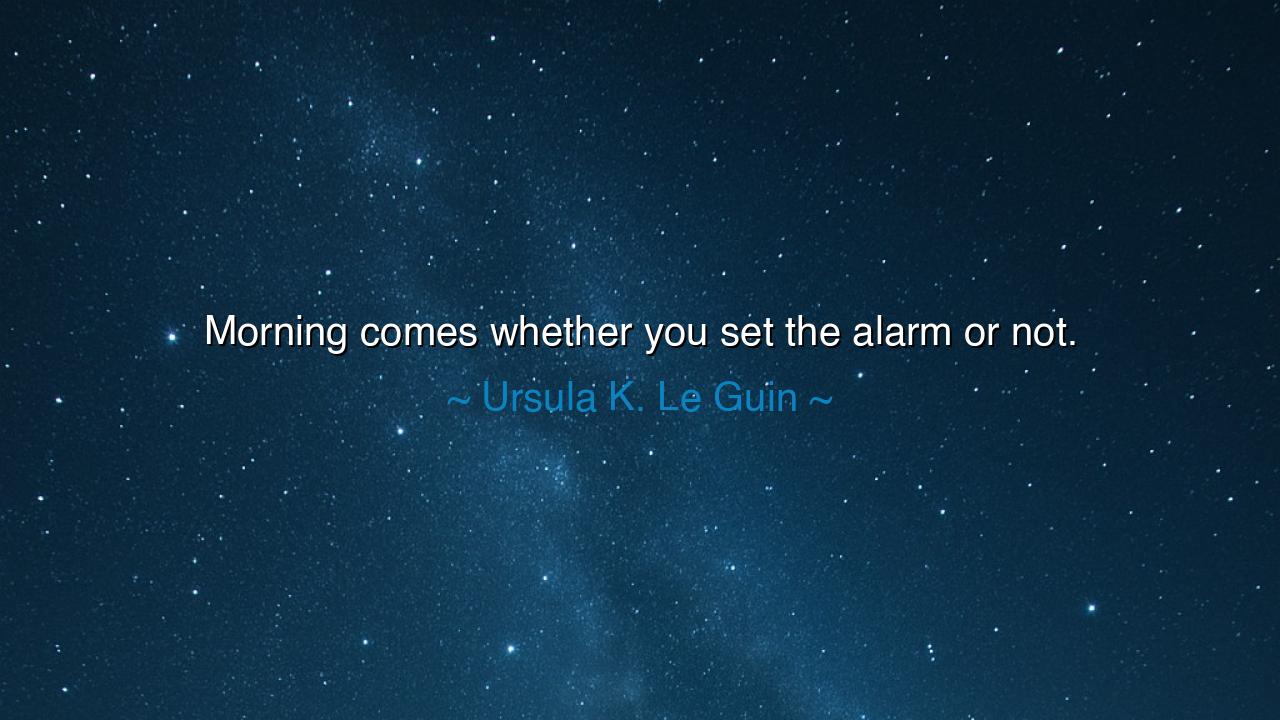
Morning comes whether you set the alarm or not.






Ursula K. Le Guin, the great weaver of worlds and teller of truths, once said: “Morning comes whether you set the alarm or not.” At first her words seem simple, even playful, but within them lies a wisdom that is both humbling and liberating. For she speaks not merely of waking hours, but of the eternal flow of time, the relentless movement of life itself. The dawn rises beyond our control; whether we prepare or resist, morning comes, indifferent to our clocks, our fears, or our desires.
The ancients knew this well. The sun of Helios did not wait upon mortals to awaken. Each day he drove his fiery chariot across the sky, untamed and unbending, whether kings were ready for counsel or peasants prepared for toil. This is the heart of Le Guin’s wisdom: life unfolds regardless of human will. To set the alarm is to participate; to refuse it is to retreat—but the sun rises nonetheless. The lesson is not one of despair, but of perspective: our lives are not the measure of the universe, but rather the universe is the measure of us.
Consider the tale of Marcus Aurelius, the philosopher-emperor of Rome. In his Meditations, he reminds himself again and again that nature’s cycles move forward, indifferent to man’s anxieties. The stars do not delay their course; the morning dew does not ask permission to fall. Marcus understood that to resist this truth is folly. Instead, one must align oneself with it, greeting each dawn with readiness, for it will come whether one welcomes it or hides beneath the cloak of sleep.
In our own age, the same truth is revealed in the lives of those who delay their duties. Think of the student who ignores his studies, believing he can postpone his reckoning. Yet the day of the exam arrives as surely as the sun. Or the man who neglects his health, thinking tomorrow can be forever delayed. But time, relentless, calls him forward, and the morning of consequence comes whether he has prepared or not. The wisdom of Le Guin’s words pierces the illusions of procrastination and reminds us: dawn waits for no one.
But there is comfort here as well. For just as morning brings responsibility, it also brings renewal. No matter the sorrow of yesterday, no matter the failures of the night, the sun will still rise. This is the mercy hidden within inevitability. The alarm may not be set, the will may falter, but still the light returns. Thus Le Guin teaches us to find solace in the constancy of life’s rhythms. The world does not demand our perfection, only our willingness to meet the day when it comes.
The lesson, then, is this: embrace the flow of time, for it cannot be mastered. Do not waste energy wishing for delay or clinging to what is gone. Instead, prepare your spirit so that when morning comes—whether in the literal dawn or in the symbolic dawns of life’s turning points—you are ready to greet it. Speak to yourself: “The sun rises without my command. Let me rise to meet it, and not hide from it.”
Practical action follows naturally: cultivate habits that honor the dawn. Rise with purpose, even if your heart resists. Begin each day with a word of gratitude, a breath of calm, a small act that anchors you in readiness. And when inevitable change approaches—whether a new stage of life, a challenge long avoided, or the end of something cherished—do not shrink away. Remember Le Guin’s wisdom: morning comes whether you set the alarm or not. Better, then, to rise boldly and greet it as a friend, rather than be dragged unwilling into its light.
Thus, let these words be carried as a flame of understanding: life moves forward, untouched by our reluctance, and the dawn will always return. Our task is not to command the sun but to command ourselves. And those who learn this truth will live not as fugitives of time, but as companions of its eternal rhythm.






AAdministratorAdministrator
Welcome, honored guests. Please leave a comment, we will respond soon